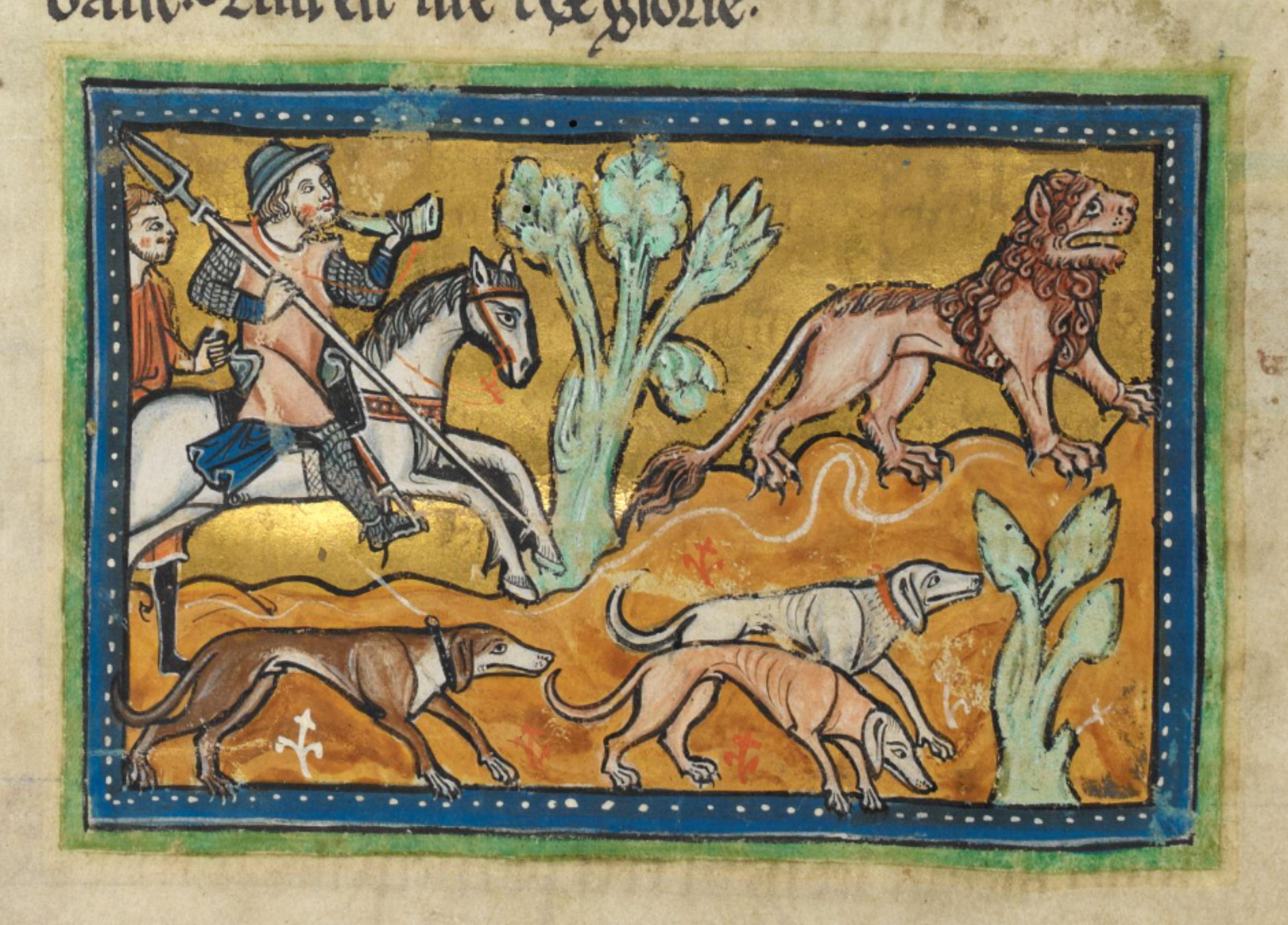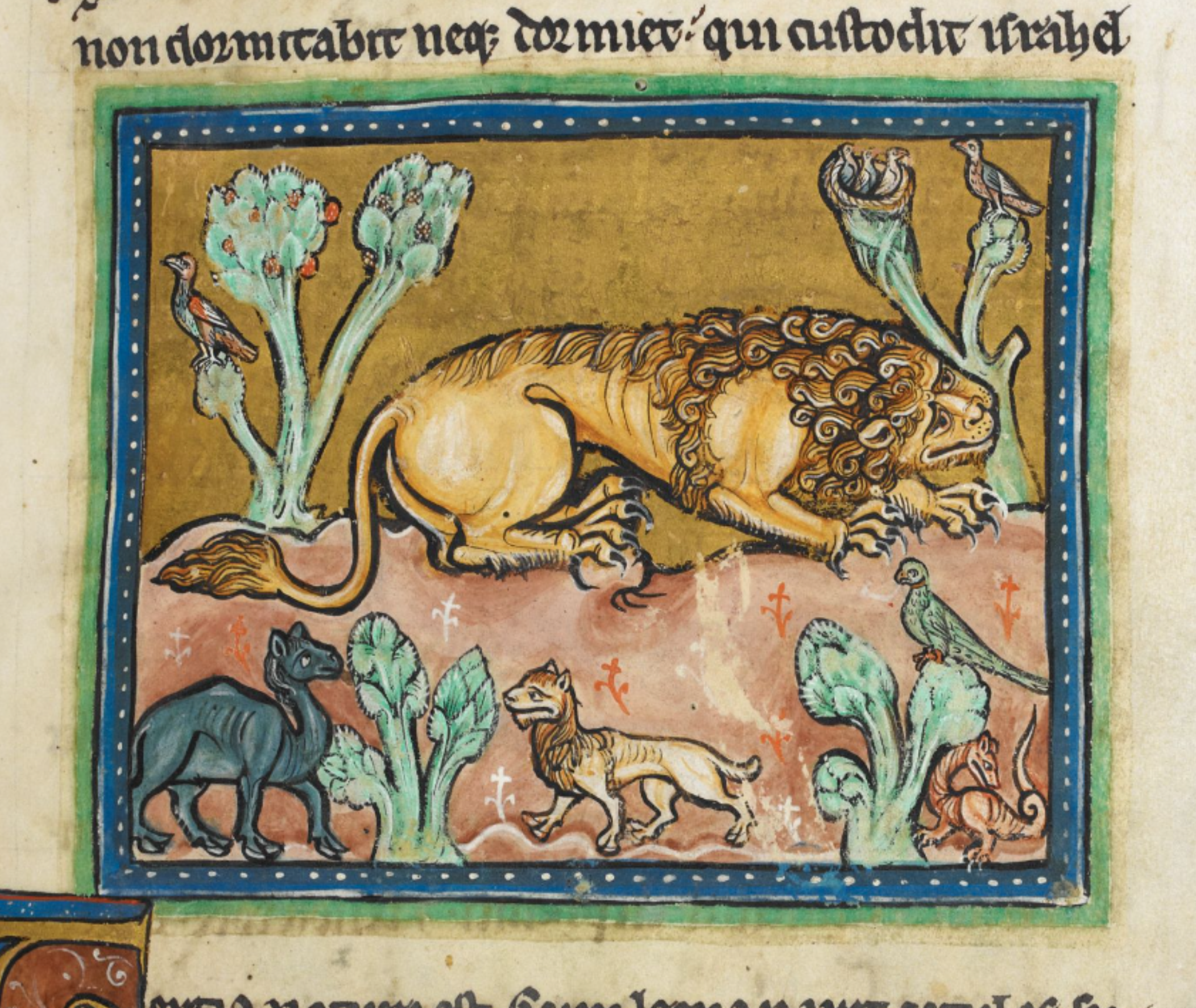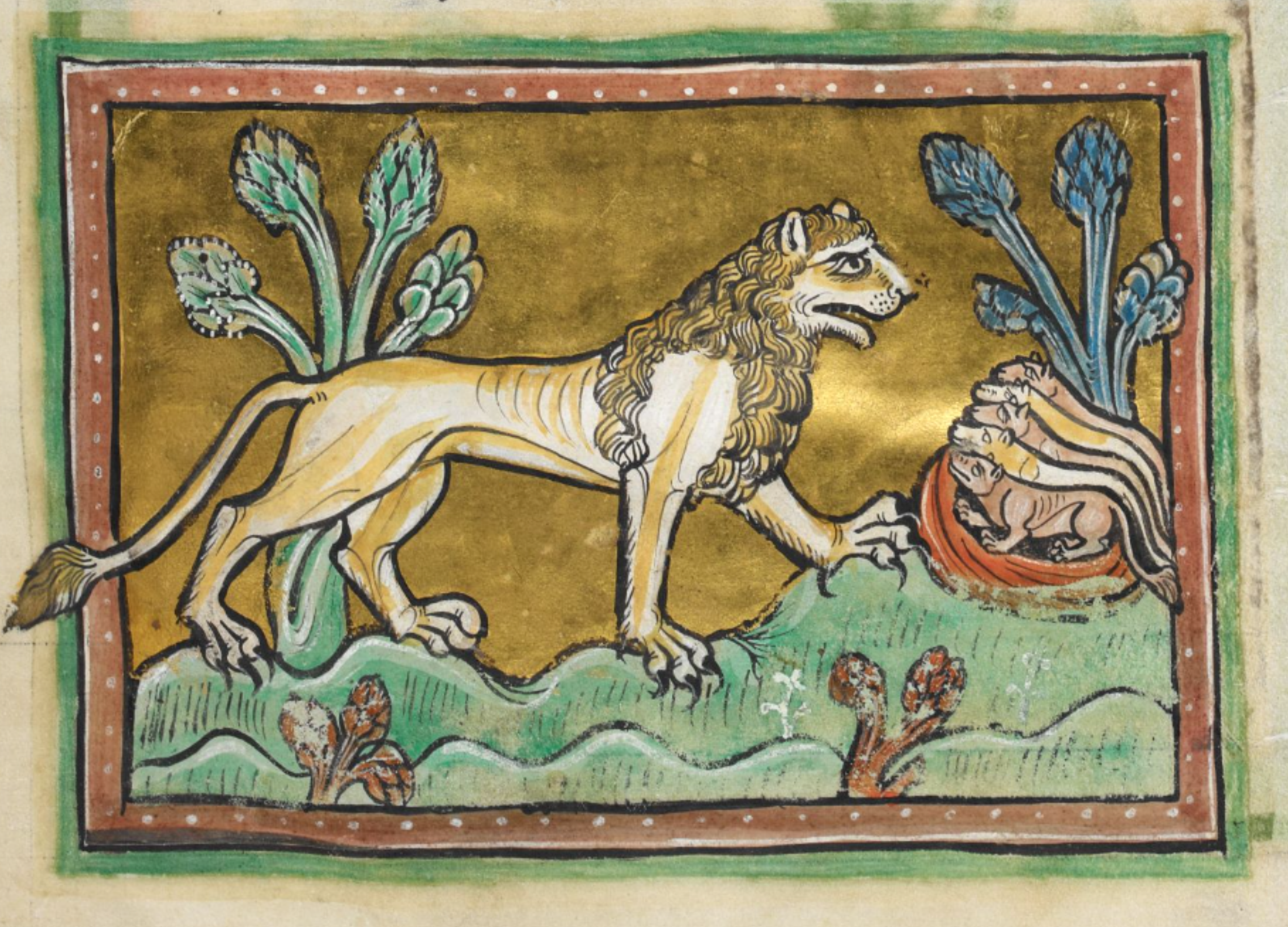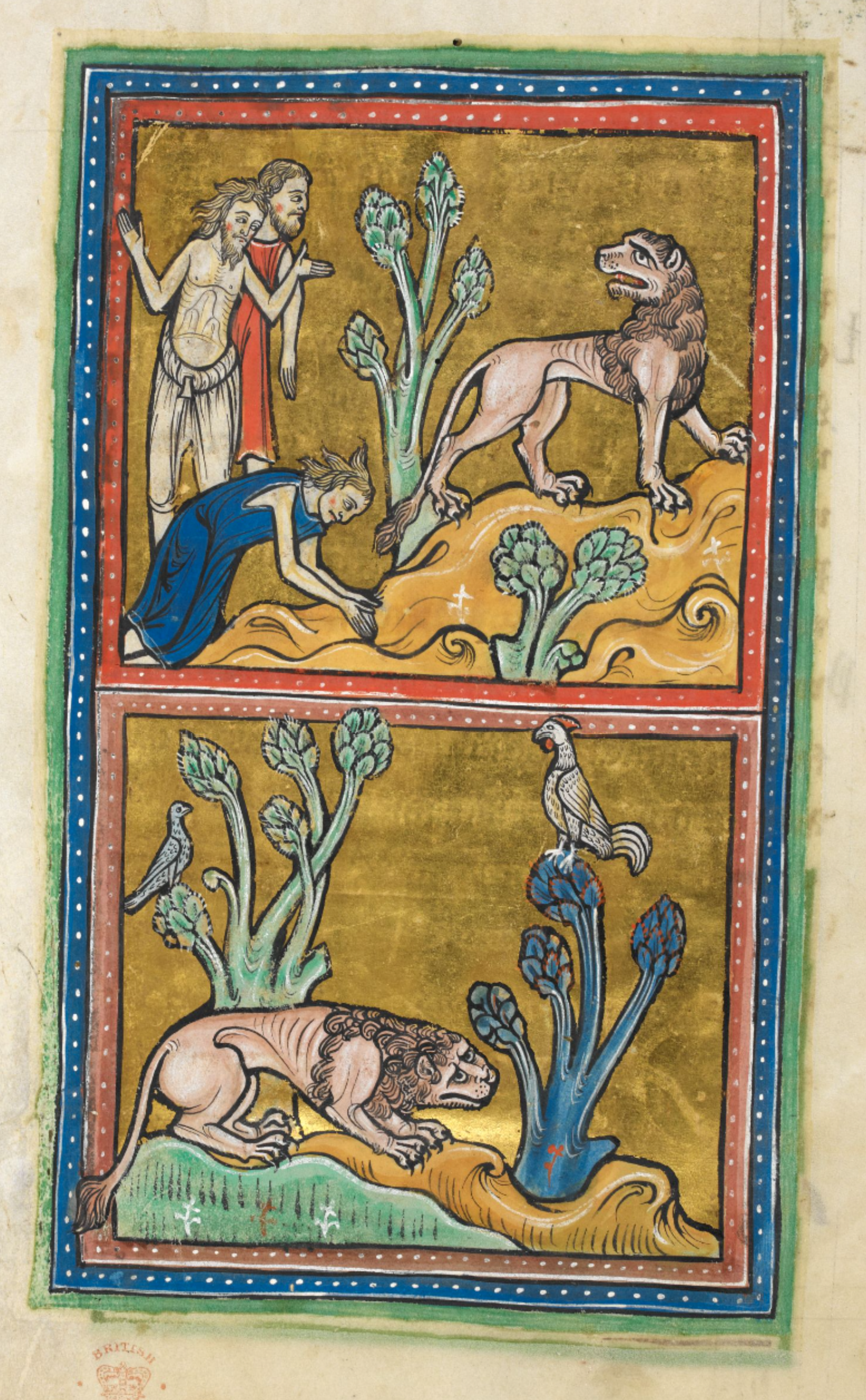
Lion, Rochester Bestiary, c.1230
Search page
Search within this page here, search the collection page or search the website.
Index
Introduction to the Rochester Bestiary, c.1230
Tiger, Rochester Bestiary, c.1230
Lion, Rochester Bestiary, c.1230
In Medieval Christian religion, the lion was sometimes associated with Christ in order to emphasise His power and authority over all His creation. Christ was seen as the saviour and the ruler. In revelation 5:5, Christ was called the Lion of Judah1, firstly because the lion was the symbol of the House of Judah and Jesus a descendent of the House of Judah, secondly because he was supposed to be a king and the lion symbolises the king of all beasts.

Lions were also a symbol of the resurrection of Christ after three days. Christians believed that lions’ cubs were born dead and remained as such for three days until their fathers breathed life into them.

They also symbolised purity and virginity owing to the lion’s habit of sleeping with its eyes open as a sign of vigilance and purity. The Virgin Mary was also perpetually pure and virgin and watched over humanity with care.

Intriguingly, the narrative also touches upon mythical elements, such as the leontophones, small beasts whose ashes have lethal effects on lions. This juxtaposition of natural history with folklore adds layers of intrigue to the Bestiarium, making it a captivating exploration of the animal kingdom's complexities and mysteries.

F3r
conuenit leonibus. pardis. et ti-
gribus. lupis et uulpibus. canibus
et simiis. ac ceteris que uel
ore uel unguibus seuiunt. Excep-
tis serpentibus; Bestie autem
dicite; a ui; qua seuiunt. Fere
appellate; eo quod naturali utun-
tur libertate. et desiderio suo fe-
rantur. Sunt enim libere eorum uoluntates. et huc atque
illuc uagantur. et quo animus duxerit; eo ferantur.
Grece enim leon vocatur. et est nomen nothum. et ex parte corruptum
Leo enim grece; latine interpretatur rex; eo quod princeps est
omnium bestiarum Huius genus tripharium(changed from triumpharium) genus dicitur. e quibus breves
et iuba crispa; imbelles sunt. longi et coma simpli-
ci. acres animos eorum et cauda indicat. Virtus eorum
in pectore. Firmitas autem; in capite. Rotarum timent
strepitus. sed ignes magis. Leo nature sue in superbis feroci-
tatem sui aliarum ferarum generibus miscere nescit.
F3v
tium amat ire. Et si contigerit ut queratur a ve-
natoribus; venit ad eum odor venatorium. et cum cau-
da sua tegit post tergum vestigia sua. Tunc vena-
tores eum investigare nequeunt. Sic et salvator
noster scilicet spiritualis leo de tribu iuda. Radix iesse. fi-
lius david cooperuit vestigia sue caritatis in celis.
donec missus a patre descenderet in uterum virginis ma-
rie. et salvaret genus humanum quod perierat. et
hoc ignorans diabolus. scilicet humani generis ini-
micus; quasi purum hominem ausus est temptare. Etiam
hoc ignorantes qui sursum erant angeli; eo ascenden-
te ad patrem dicebant ad eos qui cum eo ascende-
bant. Quis est iste rex glorie; apertos habere perhibetur. Sic et dominus noster cor-
poraliter obdormiens in cruce; sepultus est. et deitas
eius vigilabat. Sicut dicitur in canticis canticorum
Ego dormio et cor meum vigilat Et in psalmo. Ecce
non dormitabit neque dormiet; qui custodit israhel.
os; generat eos mortuos. et custodit eos tribus
diebus. donec veniens pater eorum insufflat in faciem eorum
et vi vivificat eos. Hic omnipotens pater dominum nostrum
iesum christum tercia die suscitavit a mortuis; dicente
iacob [ ] dormitabit tamquam leo. et sicut catulus leonis
F4v
lesi nequeant irasci. Ad cuius exemplum rationabiles homi-
nes respicere debent. qui non lesi irascuntur. et innocentes
opprimunt. Cum iubeat christiana lex dimittere liberos. Patet
enim leonum misericordia exemplis assiduis. Prostra-
tis enim parcunt. captivos obvios repatriare permittunt. In viros potius quam in feminas seviunt. Infantes non nisi
magna fame perimunt. Pariter omnes parcunt a sagina. Primum quod alternis diebus potum. alternis cibum ca-
piant. Ac frequenter si digestio non est insecuta; solite
cibationi supponunt diem. Tunc quidem carnes iusto
amplius devoratas; conggregrant. et insertis in ora un-
guibus sponte eas pertrahunt. Sane et cum fugiendum
est in sacietate idem faciunt. Senectam leonum defec-
tio probat dentium. Aversi coeunt. Nec hii tantum;
sed et linces et cameli. et elephanti. et rinocerotes. et tigri-
des. et leene. Fetu primo catulos quinque educant. Deinde
per singulos numerum decoqunt. annis insequentibus et
postremo cum ad unum pervenerint; materna fecun-
ditas rescinditur. Sterilescunt in eternum. Leo ci-
bum fastidit hesternum. et ipsas sue esce reliquias
adversatur. Que autem ei se scire fera audeat cuius
F5r
um que per celeritatem possunt evadere eius impetum;
rugitus eius sonitu velut quadam attonita atque vic-
ta deficiant. Leo eger simiam querit; ut devoret. quo
possit sanari. Leo; gallum. et maxime album veretur.
Leo quidem est rex ferarum. exiguo scorpionis aculeo exa-
gitatur et veneno serpentis occiditur. Leontopho-
nos vocari accipimus modicas bestias Que capite ex-
uruntur. ut earum cineris aspergine carnes sint
pollute. Iacteque per compita concurrentium semitarum; leo-
nes necent. si quantulumcumque ex illis sumpserint.
Propterea leones naturali eas premunt odio. atque ubi
facultas data est; morsu quidem abstinent. sed dilani-
atas exanimant pedum nisibus
Further Reading
David Badke, The Bestiary Blog: Animals in the Middle Ages, Lion, November 6 2023, https://bestiary.ca/beasts/beast78.htm
Josh Goldenberg (BA 2012) and Matt Shanahan (BA 2014, Logeion, November 2022, https://logeion.uchicago.edu/
Castiglioni, L. and Mariotti, S. (1996). Vocabolario della Lingua Latina: Latino-Italiano Italiano-Latino. Terza Edizione. Loescher Torino
Matthews, J. and Matthews C., (2010), The Element Encyclopedia of Magical Creatures, HarperCollins UK, London
Curley, M. J., Physiologus: A Medieval Book of Nature Lore (University of Chicago edition 2009)
Rackham, H., M.A., Pliny Natural History Volume III, Libri VIII-XI (London: William Heinemann Ltd, 1949)
Collins, A. H., M.A., Symbolism of Animals and Birds (New York: McBride, Nast & Company, 1913)
Henderson, C., The Book of Barely Imagined Beings (London: University of Chicago Press, 2013)
White, T. H., The Bestiary: A Book of Beasts (New York: G.P Putnam’s Sons, 1960)
Barney, S. A., Lewis, W. J., Beach A., Berghof O., The Etymologies of Isidore of Seville (New York: Cambridge University Press, 2006)
Endnotes
1 Revelation 5:5: “Then one of the elders said to me, “Do not weep! See, the Lion of the tribe of Judah, the Root of David, has triumphed. He is able to open the scroll and its seven seals.”
2 Leontophones are supposedly small animals that could kill a lion if they are eaten. It comes from Greek leonthophonos (lion killer). When their body is burnt, their ashes can be sprinkled on a piece of meat to bait the lion.
